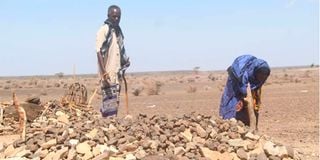Report: One person dying from hunger every 48 seconds in drought-hit areas

Relatives tend to the grave of Barako Elema Abudho who died of starvation at Galas in North Horr, Marsabit County.
The number of people in need of humanitarian assistance in Kenya has hit 3.5 million.
Further, one person is likely dying of hunger every 48 seconds in drought-ravaged Kenya, Ethiopia, and Somalia, Oxfam and Save the Children say in a report published on Wednesday highlighting the world's repeated failure to stave off preventable disasters.
More than a decade since the delayed response to the 2011 famine that killed more than 260,000 people in Somalia – half of them children under five – the world is once again failing to avert catastrophic hunger in East Africa.
The number is 40.4 million in the Intergovernmental Authority on Development region, whose member states are Kenya, Djibouti, Ethiopia, Somalia, Sudan, Uganda, Eritrea, and South Sudan.
"The drought – already cited as the worst in four decades – is worsening the humanitarian situation in a region characterized by underlying vulnerabilities and already suffering from the impact of multiple shocks including desert locusts, the Covid-19 pandemic and its socioeconomic implications, exponentially high food prices, and localized, protracted and violent armed conflict and insecurity," Save the Children Kenya and Madagascar Country Director Yvonne Arunga said.
The situation is projected to worsen after the Famine Early Warning Systems Network projected in May that the October-December 2022 short rains season will also be below average, setting the stage for an unprecedented five-season drought.
This will push the number of people in need of humanitarian food assistance in Kenya to an estimated 4.5 million.
According to the report, families in Arid and Semi-Arid Lands (Asals) can no longer cope.
"These people are used to coping with occasional droughts and dry seasons, but the successive droughts have pushed their resiliency to the limit," she added.
Children are always hit hardest by a food crisis – without enough to eat and the right nutritional balance, they are at high risk of malnutrition.
Malnutrition leads to stunting, impairs mental and physical development in the long run, increases the risk of other illnesses, and ultimately causes death.
"For many children in Kenya and in the Horn of Africa, time is running out. The clock is ticking and every minute that passes is a minute too close to starvation and possible death of a child," Ms Arunga added.
As of March, the number of people aged six to 59 months requiring treatment for acute malnutrition in Kenya had increased to 755,000, representing a 15.6 percent rise from 653,000 in August 2021.
The Asals Humanitarian Network, a group of 30 local and national organisations from the most affected dryland communities in Northern Kenya, has also raised concerns about the current situation.
Ahmed Ibrahim, the network's convener, said that earlier action would have helped prevent the escalation of the crisis, reduced suffering, and cost less than the large-scale humanitarian response required now.
"We are currently in the fourth consecutive failed rain season and are witnessing a worsening crisis, with famine looming. The situation has deteriorated rapidly since we first triggered our response to the drought in July 2021," Mr Ibrahim said.
Kenyan herders must trek longer distances in search of water and pasture, increasing the risk of resource-based conflict and family separation, which heightens the risk of gender-based violence.
The report finds that entrenched bureaucracies and self-serving political choices continue to curtail a unified global response despite improved warning systems and local NGOs' efforts.
"This drought will spiral out of control if we don't act collectively as a nation and region. The national and county leaderships must not only respond swiftly, but also invest in food security, diversified livelihood options, and stronger social protection systems as pillars of resilience to cushion Kenyans who face hunger and starvation in every drought cycle,” said Oxfam Kenya Country Director Dr John Kitui.
“Institutions need to listen to early warning systems and recommendations by local organisations who understand local realities to mitigate future calamities and to foster timely humanitarian responses."
The report, Dangerous Delay 2: The Cost of Inaction, issued in partnership with the Jameel Observatory, examines the changes in the humanitarian aid system since 2011. Despite an improved response to the 2017 East Africa drought, when widespread famine was averted, the national and global responses have remained mainly too slow and too limited to prevent a repeat today.
The G7 and other rich nations have turned inwards in response to various global crises, such as Covid-19 and, more recently, the Ukraine conflict, including by backtracking on their promised aid to poor countries and driving them to the edge of bankruptcy with debt.
"Despite worsening warning signs over time, world leaders have responded woefully – too late and still too little – leaving millions of people facing catastrophic hunger. Starvation is a political failure", said Gabriella Bucher, Oxfam International's executive director.
The report adds that East African governments bear responsibility, having delayed their responses and often refused to acknowledge the scale of the crisis at their doorsteps.
They have not adequately invested in agriculture or social protection systems to help people better cope with the drivers of hunger, including climatic and economic shocks.
Climate-induced drought, compounded by conflicts, forces people out of their homes, and the Covid-19 economic turmoil has decimated people's last ability to cope. The Ukraine conflict has also driven already soaring food prices to the highest levels ever recorded, making food unattainable for millions.
"The situation is devastating. Both human beings and livestock are at risk of dying. Already, children, pregnant mothers and the elderly in some parts of Marsabit and Samburu counties in Kenya are being reported as dying. If urgent intervention is not provided now, we are likely to witness even more death," said Jane Meriwas, the director of the Samburu Women Trust.





